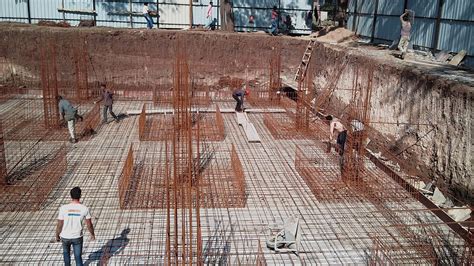Civil engineering is a crucial and multifaceted field that plays a vital role in shaping our built environment. If you’re considering pursuing a career in civil engineering, it’s essential to choose a program that not only provides you with a strong academic foundation but also offers ample opportunities for hands-on experience and professional development. In this blog post, we’ll explore the various aspects of civil engineering programs offered at universities across the United States. From the importance of these programs and their curriculum overviews to specializations, internships, research projects, and industry partnerships, we’ll delve into everything you need to know to make an informed decision about your educational and career path. Whether you’re a prospective student, a current undergraduate seeking the right program, or a professional considering further education in civil engineering, this comprehensive guide will help you understand what to expect from these programs and the potential opportunities they can open up for you.
Table of Contents
Importance of Civil Engineering Programs
Civil engineering programs play a crucial role in shaping the infrastructure of our cities and towns. The importance of these programs lies in their ability to train future engineers to design, construct, and maintain essential structures such as roads, bridges, buildings, and water systems. Without the expertise and knowledge gained from civil engineering programs, the development and functionality of our urban environments would be severely compromised.
Furthermore, civil engineering programs also help in addressing environmental concerns and sustainability. With a focus on innovative and eco-friendly design solutions, these programs are equipping students with the skills to create infrastructure that minimizes environmental impact and promotes the efficient use of resources.
Additionally, the contribution of civil engineering programs extends beyond physical infrastructure. These programs also emphasize the importance of considering social and economic factors in the planning and execution of projects, ensuring that the developments benefit communities and contribute to overall societal progress.
Overall, the importance of civil engineering programs cannot be overstated, as they are instrumental in shaping the world we live in and addressing the challenges of today and the future.
Curriculum Overview of Civil Engineering Programs
Civil engineering programs provide a comprehensive curriculum that covers a wide range of topics essential for future engineers. The curriculum typically includes courses in mathematics, physics, and chemistry to provide students with a strong foundation in the basic sciences. These are followed by specialized courses in structural engineering, transportation engineering, geotechnical engineering, and environmental engineering.
Students also take courses in construction management, project planning, and risk assessment to prepare them for the practical aspects of the profession. In addition to the technical coursework, civil engineering programs often include classes in professional ethics, communication skills, and teamwork to equip students with the soft skills necessary for success in the field.
Furthermore, many programs offer elective courses that allow students to delve deeper into specific areas of interest, such as sustainable design or earthquake engineering. These elective courses provide students with the opportunity to tailor their education to their career goals and interests.
Overall, the curriculum of civil engineering programs is designed to provide students with a well-rounded education that combines theoretical knowledge with practical skills, ensuring that they are fully prepared to tackle the challenges of the profession upon graduation.
Specializations and Concentrations in Civil Engineering Programs
One of the key aspects of civil engineering programs is the opportunity for students to specialize in a particular area of study. This allows them to focus their learning and skills development on a specific field within the broader discipline of civil engineering.
Many programs offer specializations in areas such as structural engineering, transportation engineering, environmental engineering, and geotechnical engineering. These specialized tracks provide students with in-depth knowledge and training in their chosen field, preparing them for careers in that specific area of civil engineering.
In addition to specializations, civil engineering programs often offer concentrations or elective courses that allow students to further tailor their education to their interests and career goals. These concentration options may include construction management, water resources engineering, sustainable design, or urban planning, among others.
Specializing and concentrating in a specific area of civil engineering not only allows students to pursue their passions and interests, but also enhances their marketability and expertise in their chosen field upon graduation.
Internship and Co-op Opportunities in Civil Engineering Programs
Internship and Co-op opportunities play a crucial role in enhancing the practical skills and knowledge of civil engineering students. These opportunities provide students with real-world experience and enable them to apply classroom learning to actual engineering projects.
Participating in internships and co-op programs also allows students to develop professional networks and learn from experienced engineers in the field. This hands-on experience is invaluable for students as they prepare to enter the workforce upon graduation.
Many civil engineering programs have partnerships with engineering firms, government agencies, and construction companies, providing students with a wide range of internship and co-op opportunities. These partnerships often lead to job offers for students who excel during their internships, making these programs an essential component of a civil engineering education.
Overall, internships and co-op opportunities are integral to the success of civil engineering students, providing them with the practical experience and industry connections necessary to thrive in their future careers.
Research Projects in Civil Engineering Programs
Civil engineering programs offer students the opportunity to engage in research projects that contribute to the advancement of the field. These projects allow students to apply their knowledge and skills to real-world problems and make meaningful contributions to the industry.
Research projects in civil engineering programs cover a wide range of topics, including sustainable infrastructure, transportation systems, environmental engineering, and structural analysis. Students have the opportunity to work with faculty members who are experts in their respective fields, gaining valuable mentorship and guidance throughout the research process.
Engaging in research projects also allows students to develop critical thinking and problem-solving skills. They learn to analyze complex issues, propose innovative solutions, and communicate their findings effectively. These skills are essential for success in the field of civil engineering and are highly valued by employers.
Furthermore, research projects provide students with the opportunity to network with industry professionals and potential employers. They may have the chance to present their findings at conferences or collaborate with external partners, gaining valuable experience and expanding their professional connections.
Industry Partnerships and Collaboration in Civil Engineering Programs
In today’s rapidly evolving engineering landscape, industry partnerships and collaboration play a crucial role in shaping civil engineering programs. These collaborations provide numerous benefits to both students and faculty, fostering a dynamic learning environment and real-world experience.
Through partnerships with various industry leaders, students have the opportunity to gain hands-on experience through internships, co-op programs, and research projects. This not only enhances their skillset but also provides them with insights into industry practices, making them more competitive in the job market post-graduation.
Furthermore, these partnerships can also lead to valuable resources and funding for research initiatives within the civil engineering department. Faculty members can collaborate with industry experts to tackle real-world problems and contribute to advancements in the field. This cross-pollination of ideas and expertise ensures that the curriculum remains relevant and up-to-date, preparing students for the challenges of the professional world.
Overall, industry partnerships and collaborations are integral to the success of civil engineering programs, bridging the gap between academia and industry and ensuring that graduates are well-equipped to tackle the evolving needs of the engineering industry.
Faculty Expertise and Qualifications in Civil Engineering Programs
When choosing a civil engineering program, it’s important to consider the expertise and qualifications of the faculty. The professors and instructors at the school play a crucial role in shaping the educational experience of students. Their knowledge, experience, and research contributions can greatly impact the quality of education that students receive.
One of the key factors to look for in faculty is their educational background and professional experience. It is essential for the faculty members to have advanced degrees in civil engineering or related fields, as well as real-world experience in the industry. This allows them to bring a unique perspective to the classroom and provide students with practical insights into the field.
Another important aspect of faculty expertise is their research and publications. Engaging in cutting-edge research and contributing to the body of knowledge in civil engineering demonstrates the faculty’s commitment to staying updated with the latest advancements in the field. It also provides students with the opportunity to participate in research projects and gain hands-on experience.
Furthermore, the professional affiliations and industry connections of the faculty are significant. Their collaborations with industry partners, professional organizations, and research institutions can offer valuable networking opportunities and open doors for internships, co-op placements, and potential employment after graduation.
Campus Facilities and Resources for Civil Engineering Programs
When it comes to pursuing a degree in civil engineering, the campus facilities and resources available play a critical role in shaping the overall learning experience. From state-of-the-art laboratories to specialized software and equipment, these resources are essential for providing students with a hands-on learning experience.
One of the key facilities that students can expect to find in a civil engineering program is a dedicated civil engineering building. This building typically houses classrooms, lecture halls, and specialized laboratories for conducting experiments and research. Additionally, these facilities often include computer labs equipped with industry-standard software for design, analysis, and simulation.
Furthermore, many civil engineering programs offer access to workshops and fabrication facilities that allow students to work with a variety of materials and tools. These spaces are essential for students to gain practical experience in construction techniques, material testing, and project prototyping.
Moreover, having access to a well-stocked library with a comprehensive collection of books, journals, and research papers is crucial for students and faculty to stay updated with the latest developments in the field. The availability of digital resources and online databases further enhances the research capabilities of the program.
Alumni Success Stories from Civil Engineering Programs
Alumni Success Stories from Civil Engineering Programs
One of the most inspiring aspects of any academic program is the success stories of its alumni. In the field of Civil Engineering, the success stories of graduates serve as a testament to the quality of the program and the opportunities it provides. Many alumni of Civil Engineering programs have gone on to achieve remarkable feats in their careers, making significant contributions to the field and setting an example for future students.
Some alumni have gone on to become established engineers in top construction companies, overseeing major projects and ensuring their successful completion. Others have pursued careers in government organizations, working on infrastructure development and public works projects that have a direct impact on communities. The diverse range of roles and industries that Civil Engineering alumni have excelled in is a reflection of the comprehensive and versatile education they receive in their programs.
Additionally, the success stories of alumni can also serve as valuable networking and mentorship opportunities for current students. Many graduates are eager to give back to their alma mater by offering guidance and support to those following in their footsteps. This not only provides invaluable insights and advice to students but also strengthens the sense of community and collaboration within the Civil Engineering program.
Overall, highlighting the success stories of alumni from Civil Engineering programs is a powerful way to showcase the impact and potential of the education offered to students. It not only celebrates the achievements of past graduates but also motivates and inspires current students to strive for their own success in the field of Civil Engineering.
Career Prospects and Job Placement Rates of Civil Engineering Programs
Civil engineering programs offer promising career prospects and high job placement rates for graduates. With the rapid urbanization and infrastructure development around the world, the demand for qualified civil engineers is on the rise. Graduates with a degree in civil engineering can explore various career opportunities in the public and private sectors, ranging from construction and transportation to environmental and geotechnical engineering.
Employers highly value the skills and knowledge gained through civil engineering programs, making graduates highly sought after in the job market. Additionally, the job placement rates for civil engineering graduates are consistently high, with many students securing employment shortly after completing their degree.
Furthermore, civil engineering programs often provide students with opportunities for internships and co-op experiences, allowing them to gain practical experience and industry connections that enhance their career prospects. The hands-on training and exposure to real-world projects offered by these programs also contribute to the high job placement rates of civil engineering graduates.
Overall, pursuing a degree in civil engineering can lead to a promising and rewarding career with excellent job placement opportunities in diverse fields within the industry.






